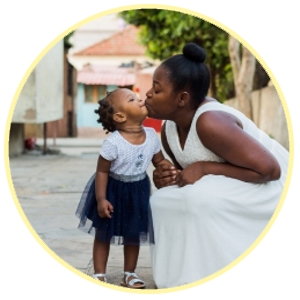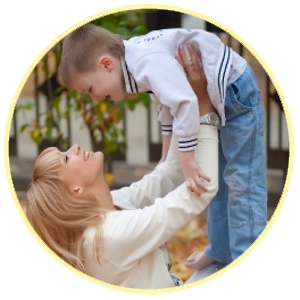The most important thing you can give your baby is your presence, ‘being with’ and enjoying them.

Babies love to communicate with their parents and for you to communicate with them. They are hard wired to connect with you from birth. Holding, comforting, talking, singing, feeding, and playing with your baby are all ways you can bond and build a connection.
How can I build my bond with my baby?
- Respond to your baby. You can’t “spoil” babies with too much attention and you won’t create bad habits by responding to them. Research has found that parents who are ‘tuned in’ and respond sensitively actually support positive brain development. By responding to their needs over time, your baby will become secure and confident.
- Try to understand what your baby is communicating to you by their behaviour. See our website section on understanding your baby and baby states which you might find to be a helpful guide.
- For some babies, particularly in the first few months after birth, they are happiest being held by their parents. Baby slings and carriers are one way you can meet your babies need for closeness, whilst also allowing you to have a spare pair of hands! Over time as they adjust to the world they may not need to be held as much.
- Trust your instincts and be led by your baby, observe, and follow their cues. They are the experts on what they need, and you will be become the expert on them. No book or website will be able to guide you more than your baby themselves!
- Use times throughout the day such as when you are feeding and changing baby’s nappy to look into your baby’s eyes, smile, and talk to them. As your baby gets older you can try simple games and looking at puzzles, toys and books with them.
- Babies love hearing human voices but particularly their parents’ voice. Talk to them as much as you can, even if just about everyday things that you are doing. Singing is also a great way to communicate with your baby (your baby will love your singing voice whatever the quality!!). This will also help their language development.
Why is it important to bond with my baby?
- “Babies’ brains double in size within the first year of life. One million neural connections are formed every second during this time…”
- “Our environments play a crucial role in shaping the developing brain in the first 1001 days.”
- “After birth sensitive, responsive interactions and loving relationships with caregivers are particularly important for early development”
The First 1001 Days. Evidence Brief: An age of opportunity
Positive early relationships have been linked with positive outcomes later in childhood such as a child’s ability to manage emotions, friendships and cope with various stressors throughout their life. In this short video, Dr Suzanne Zeedyk explains why doing the little things together with your baby is so important for brain development.
There is a particular type of interaction which scientists have called the ‘serve and return’ that helps to build a healthy brain. This includes everyday activities many parents are likely to do with their baby such as naming an object the baby is pointing to. If you would like to know more about this watch this video:
What if I am struggling to bond with my baby?
Many parents find it difficult to bond with their baby for a wide range of reasons. If you feel you are struggling to bond with your baby, talk to your health visitor who should be able to listen and support you, as well as possibly suggesting some ideas/things that might help. Your health visitor is the named person for any concerns up until your child starts school. If you do not know who your health visitor is, then contact your GP surgery and they will be able to advise you.
Visit Parent Club: Helping your baby feel connected also have some other helpful top tips and videos. Helping your baby feel connected | Parent Club

Find out more about bonding with your baby during pregnancy:
Bonding with your Baby Before Birth – Brazelton Centre UK Leaflet
Bonding With Your Baby Before Birth • ZERO TO THREE
To learn more about the importance of those every day moments see Responsive Care: Nurturing a Strong Attachment Through Everyday Moments • ZERO TO THREE















